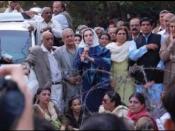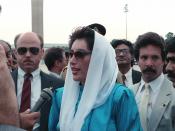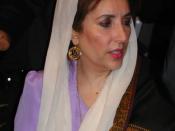The human rights commission of PakistanSince independence and partition from British India in 1947, Pakistani political institutions have been dominated by the military. Pakistan has had a military government for thirty of its fifty-eight years of independence. The Pakistani military is a descendent of the British Indian Army and has retained the institutional structure, culture, and imperial ethos of its colonial predecessor. (Ghafoor 2007 101-18) Similar observations can be made about the next most powerful institution in Pakistan, the civil bureaucracy. Most analysts of the Pakistani state and politics have described the governance structure in the country as an oligarchic relationship between the landed feudal elites and the civil and military bureaucracy. Most accounts of the Pakistani state and society have adhered to a narrative structured around civil and military bureaucracy, landed feudal elites, and ethnic and religious nationalist forces. The traditional narrative has also typically blamed the asymmetrical power of the tripartite oligarchic structure for the attenuated development of the civil-society institutions.
(Abbas, 2005 74-79)Partially in reaction to the excesses of the Zia regime and its allies, the Human Rights Commission of Pakistan (HRCP) was formed in 1986. In the two decades since its inception, the HRCP has become the most influential nongovernmental actor in the cause of human rights in Pakistan (UNDP 2000). The immediate impetus for the HRCP'S formation was opposition to a battery of regressive laws passed by the Zia regime, including the separate electorate for non-Muslim minorities of Pakistan and the Hudood ordinance, in addition to vastly enhanced powers of the state for arbitrary arrests, censorship of the press, and limiting political dissent .Although women and religious minorities were the main victims of Zia's Islamization drives, the progressive elements in the society were especially targeted for state oppression because they were deemed to be...


